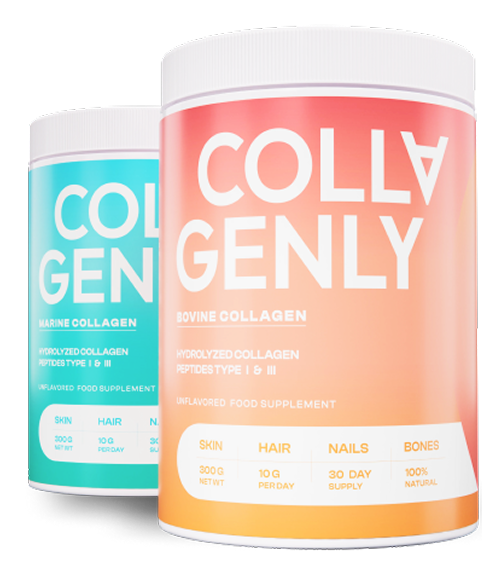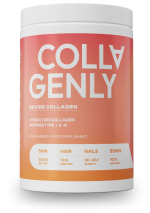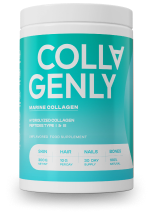As collagen supplements gain popularity, a common question arises: should you choose marine or bovine collagen? While both types offer similar health benefits, there are a few differences to consider that may help you determine the best fit for your lifestyle and preferences. Overall, marine and bovine collagen are both excellent sources of collagen peptides, and the choice ultimately comes down to personal needs and values.
Here’s a look at how marine and bovine collagen compare, their benefits, and how you can make the best choice for your health.
Collagen Basics: What Both Marine and Bovine Types Offer
Marine and bovine collagen are both derived from animal sources—marine collagen from fish skin and scales, and bovine collagen from the skin, bones, and hides of cows. Both types contain essential amino acids like glycine, proline, and hydroxyproline, which are vital for promoting skin elasticity, joint health, and overall body resilience. Marine and bovine collagen are typically hydrolyzed, meaning they’re broken down into smaller, more easily absorbed peptides, making them effective and bioavailable.
In terms of health benefits, both marine and bovine collagen:
- Improve skin elasticity and hydration, helping to reduce the appearance of wrinkles.
- Support joint and bone health, aiding in mobility and reducing discomfort.
- Boost muscle mass and strength, especially when combined with exercise.
- Promote gut health by maintaining the integrity of the gut lining.
- Support cardiovascular health by maintaining the elasticity of blood vessels.
Ultimately, both types of collagen offer powerful support for overall health, and choosing between them is less about performance and more about personal preference.
BOVINE & MARINE COLLAGEN Get Yours Today!
Shop Now
Key Differences Between Marine and Bovine Collagen
While marine and bovine collagen have many similarities, a few unique characteristics set them apart. Here are some of the main differences to keep in mind.
1. Source and Dietary Preferences
For those who have dietary restrictions or religious considerations, marine collagen may be more suitable. Since it’s derived from fish, marine collagen is generally acceptable for certain dietary practices that avoid land-based animals, such as those followed by pescatarians and individuals with specific religious practices.
Bovine collagen, on the other hand, is derived from cows and may be preferred by those with a more traditional omnivorous diet. It’s a versatile and widely accepted source of collagen that aligns with a variety of wellness practices.
2. Bioavailability and Absorption
One advantage of marine collagen is its smaller peptide size, which can make it slightly easier for the body to absorb. Some studies suggest that marine collagen may have a slightly higher bioavailability, meaning it’s absorbed more quickly into the bloodstream. This could make marine collagen particularly effective for those looking to support skin health, as it may be more efficiently utilized by skin cells.
That said, bovine collagen is still highly effective and offers excellent bioavailability, making it a popular choice among those looking to improve skin, joint, and bone health. Both types of collagen are hydrolyzed, which enhances absorption, so either option can offer effective support for a range of health goals.
3. Collagen Types: Types I vs. I and III
Marine collagen is primarily composed of Type I collagen, which is the most abundant collagen in the body and is especially beneficial for skin health, wound healing, and bone strength. Type I collagen is the major type found in our skin, making marine collagen particularly appealing for those focused on maintaining skin elasticity and hydration.
Bovine collagen, on the other hand, contains both Type I and Type III collagen. Type III collagen is found in the skin, muscles, and blood vessels, which makes it useful for supporting skin and muscle health in tandem. For those interested in a more rounded support for both skin and muscle tone, bovine collagen may offer a slight advantage.
4. Price and Accessibility
Marine collagen is typically more expensive than bovine collagen, mainly due to its limited sourcing and more involved extraction process. Fish skin and scales are less readily available than bovine hides, which are abundant due to the meat industry. This can make marine collagen a pricier option, though it may be worth the investment for those who prefer fish-based products.
Bovine collagen is often more affordable and widely accessible, making it an appealing choice for those on a budget or who are simply looking for a more readily available source of collagen.
Which Type Should You Choose?
Deciding between marine and bovine collagen comes down to your personal health goals, dietary preferences, and budget. Here are a few factors to consider when making your choice.
- If Skin Health Is Your Primary Goal: Both types of collagen support skin health, but marine collagen’s Type I content and slightly higher bioavailability make it an excellent choice for skin-focused benefits. If maintaining youthful, hydrated skin is your main goal, marine collagen may offer a slight edge.
- For Joint and Bone Health: Bovine collagen’s combination of Types I and III makes it a great choice for those looking to support joint flexibility and bone density. It’s an excellent option for individuals with an active lifestyle or those experiencing age-related joint concerns.
- For Diet and Ethical Considerations: If dietary preferences or religious beliefs play a role in your supplement choices, marine collagen may be the more compatible option, as it’s acceptable for pescatarians and may align better with specific ethical considerations. Additionally, marine collagen’s sustainable sourcing may appeal to environmentally-conscious consumers.
- Budget and Accessibility: If cost is a major consideration, bovine collagen is generally more affordable and widely available, making it a practical option for most people. While marine collagen offers unique benefits, bovine collagen provides nearly identical results at a more accessible price point.
Final Thoughts
When it comes to collagen, the good news is that both marine and bovine sources are highly effective at supporting a range of health benefits, from skin elasticity to joint health. Choosing between them is largely a matter of personal preference, dietary considerations, and budget. Both types provide the body with the essential amino acids needed to support skin, joints, muscles, and more.
At Collagenly, we offer both marine and bovine collagen options to cater to a variety of lifestyles and health goals. Whichever type you choose, you can be confident that you’re giving your body high-quality, bioavailable collagen that supports lasting wellness. Embrace the benefits of collagen with a product that fits your life, knowing that both marine and bovine collagen are powerful tools for maintaining health and longevity.
 your Cart is empty
your Cart is empty 

 Verified Customer
Verified Customer 
